- Home
- Quizzes
- My Quiz Activity
- Newsletters
- Sports Betting
- MY FAVORITES
- Add Sports/Teams
- SPORTS
-
NFL
- NFL Home
- Arizona Cardinals
- Atlanta Falcons
- Baltimore Ravens
- Buffalo Bills
- Carolina Panthers
- Chicago Bears
- Cincinnati Bengals
- Cleveland Browns
- Dallas Cowboys
- Denver Broncos
- Detroit Lions
- Green Bay Packers
- Houston Texans
- Indianapolis Colts
- Jacksonville Jaguars
- Kansas City Chiefs
- Las Vegas Raiders
- Los Angeles Chargers
- Los Angeles Rams
- Miami Dolphins
- Minnesota Vikings
- New England Patriots
- New Orleans Saints
- New York Jets
- New York Giants
- Philadelphia Eagles
- Pittsburgh Steelers
- San Francisco 49ers
- Seattle Seahawks
- Tampa Bay Buccaneers
- Tennessee Titans
- Washington Commanders
-
MLB
- MLB Home
- Arizona Diamondbacks
- Atlanta Braves
- Baltimore Orioles
- Boston Red Sox
- Chicago White Sox
- Chicago Cubs
- Cincinnati Reds
- Cleveland Guardians
- Colorado Rockies
- Detroit Tigers
- Houston Astros
- Kansas City Royals
- Los Angeles Angels
- Los Angeles Dodgers
- Miami Marlins
- Milwaukee Brewers
- Minnesota Twins
- New York Yankees
- New York Mets
- Oakland Athletics
- Philadelphia Phillies
- Pittsburgh Pirates
- San Diego Padres
- San Francisco Giants
- Seattle Mariners
- St. Louis Cardinals
- Tampa Bay Rays
- Texas Rangers
- Toronto Blue Jays
- Washington Nationals
-
NBA
- NBA Home
- Atlanta Hawks
- Boston Celtics
- Brooklyn Nets
- Charlotte Hornets
- Chicago Bulls
- Cleveland Cavaliers
- Dallas Mavericks
- Denver Nuggets
- Detroit Pistons
- Golden State Warriors
- Houston Rockets
- Indiana Pacers
- Los Angeles Clippers
- Los Angeles Lakers
- Memphis Grizzlies
- Miami Heat
- Milwaukee Bucks
- Minnesota Timberwolves
- New Orleans Pelicans
- New York Knicks
- Oklahoma City Thunder
- Orlando Magic
- Philadelphia 76ers
- Phoenix Suns
- Portland Trail Blazers
- Sacramento Kings
- San Antonio Spurs
- Toronto Raptors
- Utah Jazz
- Washington Wizards
-
NHL
- NHL Home
- Anaheim Ducks
- Arizona Coyotes
- Boston Bruins
- Buffalo Sabres
- Calgary Flames
- Carolina Hurricanes
- Chicago Blackhawks
- Colorado Avalanche
- Columbus Blue Jackets
- Dallas Stars
- Detroit Red Wings
- Edmonton Oilers
- Florida Panthers
- Los Angeles Kings
- Minnesota Wild
- Montreal Canadiens
- Nashville Predators
- New Jersey Devils
- New York Islanders
- New York Rangers
- Ottawa Senators
- Philadelphia Flyers
- Pittsburgh Penguins
- San Jose Sharks
- Seattle Kraken
- St. Louis Blues
- Tampa Bay Lightning
- Toronto Maple Leafs
- Vancouver Canucks
- Vegas Golden Knights
- Washington Capitals
- Winnipeg Jets
- NCAAF
- NCAAM
- Boxing
- Entertainment
- Lifestyle
- Golf
- MMA
- Soccer
- Tennis
- Wrestling
- More Sports
- RESOURCES
- My Account
- YB on Facebook
- YB on Twitter
- YB on Flipboard
- Contact Us
- Privacy Policy
- Terms of Service
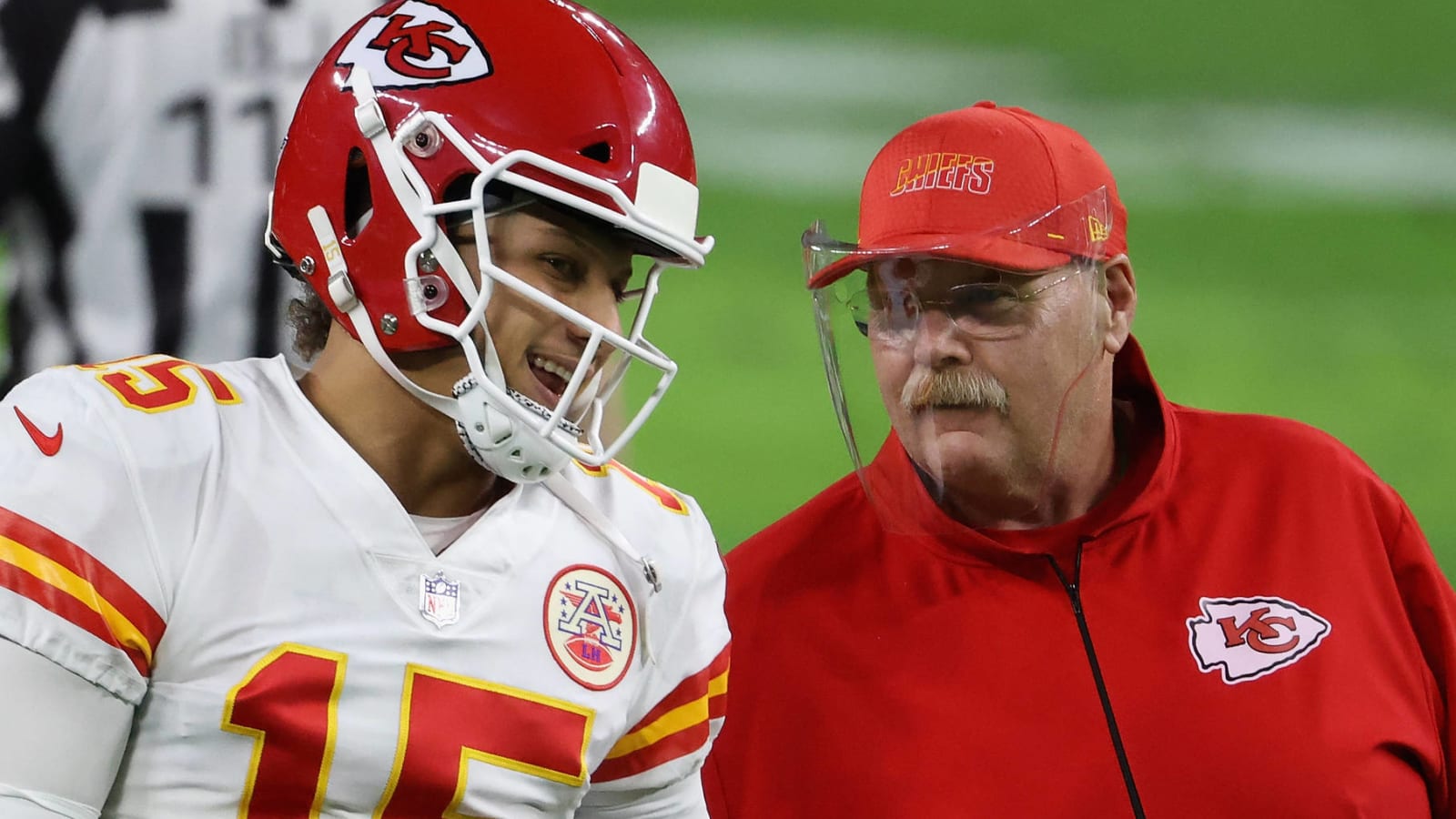
NFL teams that made three straight conference championship games
The Chiefs will become the first AFC team to host three consecutive conference championship games, but several teams have moved into this round in at least three straight seasons. Since the AFL debuted in 1960, here are the teams that have advanced to a league or conference championship three years in a row.
NFL teams that made three straight conference championship games

The Chiefs have become just the second team to appear in six straight conference championship games, while the 49ers have now appeared in three in a row. Several teams have moved into this round in at least three straight seasons. Since the AFL debuted in 1960, here are the teams that have advanced to a league or conference championship three years in a row.
2021-23 San Francisco 49ers
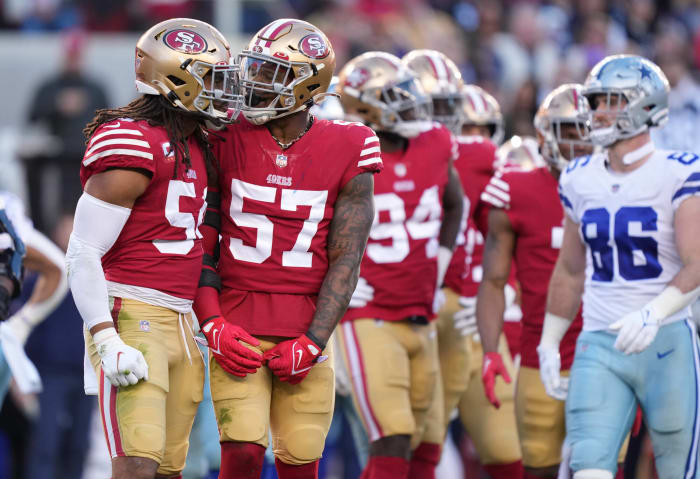
This list's most unique entry, the 49ers have journeyed to three consecutive NFC championship games despite sacrificing prime draft capital in the ill-fated Trey Lance trade. The 49ers' roster strength and Kyle Shanahan's play-calling acumen have kept the 49ers on course to the point they have been in four NFC title games in five years. QB issues have restrained this collection of All-Pros, but the 49ers finding Brock Purdy with the 2022 draft's final selection may be a historic escape route after the Lance sunk cost. The 49ers are 1-2 during this run of conference deciders, and Shanahan's bunch remains in search of a Super Bowl title the Chiefs keep denying them.
2018-23 Kansas City Chiefs

Patrick Mahomes changed a franchise's fortunes. Between 1970-2017, the Chiefs appeared in one AFC championship game. Since ditching their shtick of retread QBs (feat. many ex-49ers) and identifying a superstar, the Chiefs became the first NFL team to host five straight conference title games. They have now appeared in six consecutive AFC-deciding showdowns, going 4-2 during the streak. Breaks have gone for and against the Chiefs in this span; an ill-timed Bengals late hit and Dee Ford's offside gaffe represent pivotal points during this extended franchise peak. The Mahomes-Andy Reid run has produced three Super Bowl wins, the latter two coming despite 2022's Tyreek Hill trade.
2011-18 New England Patriots
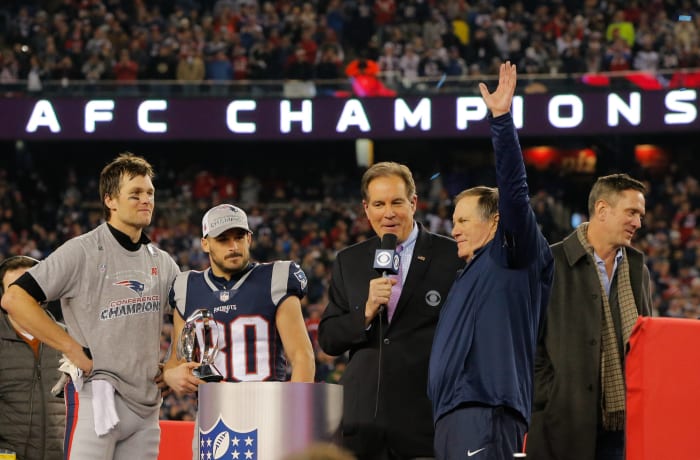
Before the Chiefs' takeover, this streak seemed nearly impossible to even approach. Running into the likes of Tim Tebow, Brock Osweiler and Marcus Mariota in certain Round 2 games helped extend the Patriots' run, but the Bill Belichick-Tom Brady partnership powered the most reliable team in NFL history. Once in the AFC championship round, the Pats went 5-3 and won three Super Bowls during the Brady-Rob Gronkowski years. The 2019 season's wild-card loss to the Titans ended this era, and a declining roster sent Brady to Tampa -- where he played in one more conference championship game and another Super Bowl for good measure.
2011-13 San Francisco 49ers

The Jim Harbaugh-Trent Baalke era started quite well, with the coach-GM combo resurrecting a franchise that had not made the playoffs since 2002. Harbaugh rebooted Alex Smith in 2011, leading to a classic 49ers-Saints second-round game, but pivoted to Colin Kaepernick in 2012. While both QBs enjoyed success, defensive consistency (three top-three units) powered these 49ers. They ran into misfortune in the 2011 title game when two Kyle Williams fumbles helped the Giants prevail in OT, and were a disputed pass interference call from the Super Bowl XLVII title. Harbaugh was gone by 2015, sliding the 49ers into a rebuild.
2001-04 Philadelphia Eagles

Reid's Chiefs followed his Eagles as the only teams to host three straight conference title games since the merger. Not as flashy as Mahomes, Donovan McNabb managed to reach this round four years in a row without much receiving help. (Terrell Owens' leg break shelved him for the 2004 NFC playoffs.) Philly's Brian Dawkins-led defenses supported McNabb well, but they could not deter the "Greatest Show on Turf" Rams in 2001. And a better Bucs defense closed Veterans Stadium emphatically a year later. While the Eagles beat the Falcons to advance to Super Bowl XXXIX, they ran into the Spygate Patriots and saw Owens' 2005 antics halt this run.
1995-97 Green Bay Packers

In Bad Boy Pistons fashion, the Packers took over after the Cowboys-49ers rivalry fizzled. The Lakers-Celtics-esque series dominated the NFL for years, but the Packers' 1996 Super Bowl champion team was on the level of those Cowboys and 49ers nuclei. The 13-3 team ranked first on offense and defense and beat three playoff squads by at least two scores, routing Carolina in the NFC title game. Brett Favre from 1995-97 is the only player to win three straight MVPs, and he defeated the 49ers by multiple scores in each of these playoffs. Steve Young's masterful throw in the 1998 first round ended the Favre-Mike Holmgren era, however.
1992-95 Dallas Cowboys
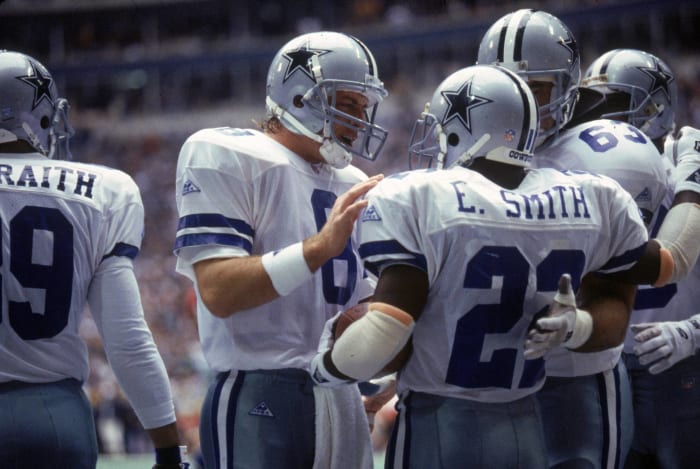
A defining NFL "what if?" spawned when Jimmy Johnson and Jerry Jones split up after the 1993 season. The brash head coach led a rapid rebuild in Dallas, with the 1989 Herschel Walker trade igniting a dynasty. Dallas won at least 12 games from 1992-95, and the Troy Aikman-, Emmitt Smith-, and Michael Irvin-driven squads beat the 49ers in two of the rivals' three NFC championship duels. The Cowboys also eliminated the Packers in three of these seasons, with the Barry Switzer-led squads doing so twice to make the best "Team of the '90s" claim. After Super Bowl XXX, however, the franchise began a steady decline. The Cowboys have not made it past Round 2 since.
1992-94 San Francisco 49ers
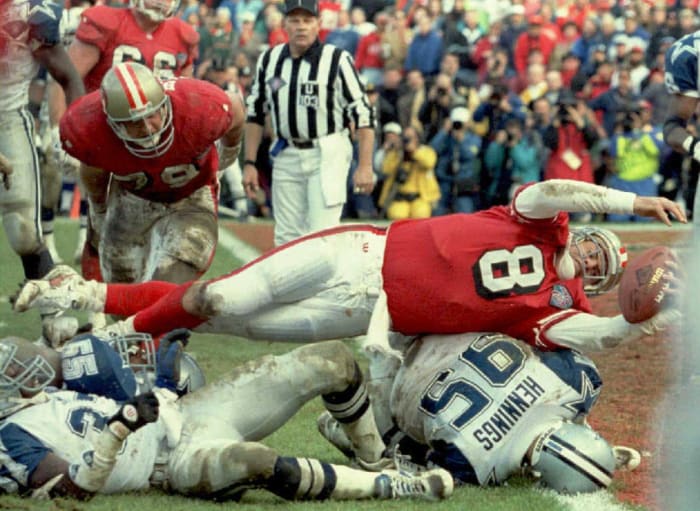
The Steve Young leg of the 49ers dynasty produced one of the league's most memorable rivalries, with 49ers-Cowboys viewed as the de facto NFL championship at the time. Young won MVP honors in 1992 and '94, becoming the league's top QB for a few years upon being given the 49ers reins (and the chance to target a still-thriving Jerry Rice) at age 30. Dallas winning this series' first two playoff games led to the 1994 49ers loading up in free agency. Deion Sanders and Co. helped the team stave off Switzer's Cowboys and win a fifth Super Bowl. A loaded '95 team (sans Sanders) could not stop the Packers in Round 2 -- a sign of the NFC's future.
1990-93 Buffalo Bills

Less drama existed on the AFC side in these years. The Bill Polian-Marv Levy duo's moves in the 1980s created one of the most consistent teams in NFL history. Fronted by four Hall of Famers, the Bills took over the AFC. They needed to play in just one wild-card game in this span and turned that day into a playoff-record 32-point comeback. Buffalo won twice with backup QB Frank Reich in the 1992 AFC bracket, but Jim Kelly's crew blew out three of the four teams it faced -- the Raiders, Dolphins, and Chiefs -- in conference title tilts. The 1991 Broncos provided the best resistance, losing 10-7. Super Bowls ... did not go as well.
1988-90 San Francisco 49ers

After a shocking upset loss to the Vikings in 1987, the 49ers wrapped up the "Team of the '80s" debate. Joe Montana held off Young in the Hall of Famers' 1988 QB battle and led a 28-3 romp past the No. 1-seeded Bears to reach Super Bowl XXIII. Equipped with an unrivaled weapon in Rice, Montana won the next two MVPs and did so despite Bill Walsh's 1989 retirement. George Seifert's stacked '89 49ers beat playoff opposition 126-26, crushing the Rams to reach Super Bowl XXIV. This era's 49ers won an NFL-record 18 straight road games, but a narrow home loss to the Giants -- featuring a brutal Montana injury -- ended the NFL's best modern threepeat bid.
1980-82 Dallas Cowboys
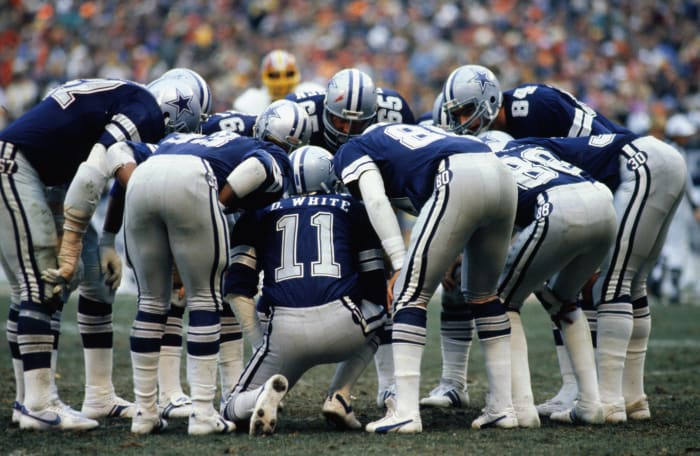
This era's NFC became a gauntlet soon after this Cowboys stretch, but Tom Landry's system hummed into the '80s and came within a Dwight Clark catch and Eric Wright tackle of facing the Bengals in Super Bowl XVI. After riding Roger Staubach and their "Doomsday" defense to reach five Super Bowls in the '70s, the Cowboys' Danny White-driven teams fell short. The Eagles derailed the Cowboys by two scores en route to Super Bowl XV; Washington did the same in a strike-shortened season two years later. The Cowboys fell off the NFC's blistering pace and did not win a playoff game again until 1991.
1973-77 Oakland Raiders
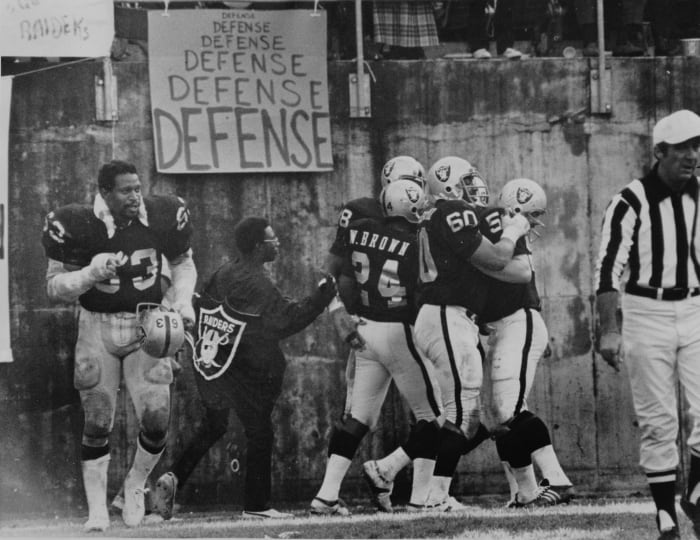
For conference championship cameos, John Madden's Raiders are the closest thing to the 2010s Patriots. From 1967-77, Oakland made nine conference title games. However, the team with Ken Stabler and an all-time offensive line often fell short. Intersecting with the Dolphins and Steelers' dynasties, the '70s Raiders made just one Super Bowl berth. They won two named games -- 1974's "Sea of Hands" against the Dolphins and 1977's "Ghost to the Post" in Baltimore -- to reach the conference title round and went 16-1 in 1976 but lost to the eventual Super Bowl champion (the Dolphins or Steelers) three times during this period. Madden retired after the 1978 slate.
1974-76 Pittsburgh Steelers
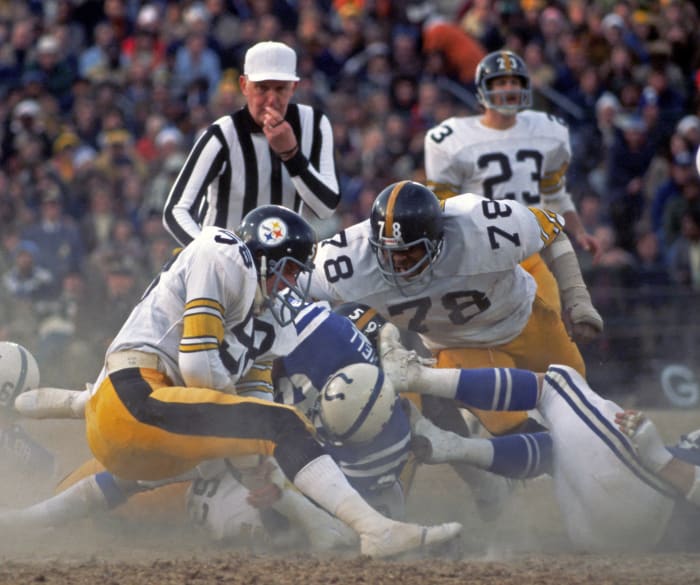
The best of the "Steel Curtain"-era teams' probably formed in 1978, but the Steelers lived up to their nickname best during a mid-1970s rise. Their five-Hall of Famer defense ruled the AFC for most of this span, helping cover for a less consistent Terry Bradshaw and eventually dominating to the point the NFL made rule changes. No team came within a touchdown of the 1974 Steelers in the playoffs, and Pittsburgh's plus-211 scoring team downed Oakland on an icy day a year later. The Raiders halted the Steelers' three-peat bid but only after the Joe Greene-led defense allowed four TDs during a nine-game win streak to reach that third title game.
1974-76 Los Angeles Rams

QB stability eluded these Rams, but their starting lineups became flush with draftees acquired by trading passers. Blockbuster deals that shipped Roman Gabriel and John Hadl out of town in 1973 and '74 provided balance to defense-fueled squads. The Rams used James Harris, Ron Jaworski, and Pat Haden in these respective playoffs but won one postseason game with each. However, the Cowboys and Vikings employed Hall of Fame QBs (Staubach and Fran Tarkenton) and ran the NFC at this point. Vikes DB Bobby Bryant's banner day stopped the last of these Rams teams, but several Chuck Knox-years holdovers were on the 1979 squad that pushed the Steelers in Super Bowl XIV.
1971-73 Miami Dolphins

Had the NFL implemented its current home-field advantage setup, these Dolphins would have hosted three straight AFC title games. They had the better record against the Colts, Steelers, and Raiders. The perfect 1972 team had to secure a Super Bowl berth in Pittsburgh. Miami built its dynasty through run-game dominance. Buoyed by Larry Csonka and Mercury Morris, the Dolphins led the NFL in rushing from 1971-74. Bob Griese threw 19 combined passes in these three title games; the Dolphins won each. The quickly defunct World Football League raided Miami's roster, poaching Csonka and Paul Warfield, helping to end this dynasty by 1975.
1970-73 Dallas Cowboys

For as celebrated as Staubach's career became, the iconic passer only started seven full seasons. Landry started Craig Morton in 1970, and after turning to Staubach to end a 1971 QB controversy en route to the team's first Super Bowl title, he went back to Morton in '72. Boosted by the additions of Herb Adderley, Lance Alworth, and Mike Ditka, the 1971 team boasted nine Hall of Famers. However, the Cowboys -- even after benching Morton for Staubach during a 1972 divisional-round comeback over the 49ers, whom Dallas eliminated from 1970-72 -- lost to Washington and Minnesota in the latter two NFC title games here.
1967-70 Oakland Raiders

Ahead of the 1967 season, the Raiders drafted Hall of Fame guard Gene Upshaw and traded for Daryle Lamonica and Willie Brown. These moves catalyzed a Raiders rise that did not fully cool off until the late 1980s. Lamonica's deep-strike style led Oakland to a 37-4-1 record in the AFL's final three seasons; he won MVP honors during a '67 season that saw the Raiders rout the Oilers en route to Super Bowl II. A familiar pattern began in the years following the loss to the Packers. The Jets and Chiefs upset the Raiders to reach the next two Super Bowls (and win them), and Madden's second season ended with a loss to the champion Colts.
1965-67 Green Bay Packers
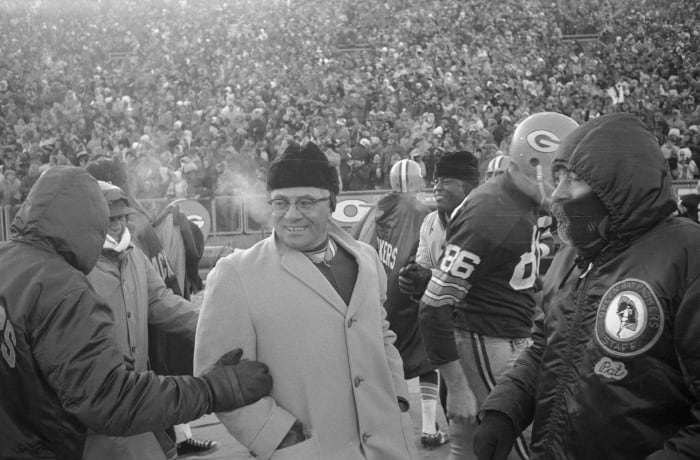
Part 2 of Vince Lombardi's storied Packers run involved the NFL's only playoff-era threepeat. Since the Super Bowl did not exist in 1965, Green Bay's 23-12 win over Cleveland -- in Jim Brown's final game -- counts as a title ahead of its back-to-back Super Bowl triumphs. The Packers beat the Browns despite the latter having a bye of sorts, and Bart Starr's four TD passes drove Green Bay past Dallas and into Super Bowl I. An aging Packer team went just 9-4 and ranked ninth in scoring but survived the Cowboys in 1967's "Ice Bowl." Lombardi retired after Super Bowl II; Green Bay did not make a conference title game again until 1995.
1964-66 Buffalo Bills

Josh Allen and Co. are gunning to give the Bills their first Super Bowl championship, but the franchise does have two AFL titles. The Bills won back-to-back crowns in 1964 and '65. While the AFL was an eight-team league in those years, the latter Buffalo conquest -- a 23-0 win over the Chargers -- marks the most recent AFL or Super Bowl title-sealing shutout. Lou Saban's 1964 team ranked first on offense and defense. The Bills notched three INTs and rode fullback dynamo Cookie Gilchrist's 122-yard rushing day to a 20-7 win. A Hall of Famer-laden Chiefs defense shut down the Bills in 1966, and Buffalo faded in the AFL's final years.
1963-65 San Diego Chargers

Architected by passing-game forefather Sid Gillman, the Chargers began their three-appearance span with one of the most dominant championship performances in sports history. Behind Alworth, fullback Keith Lincoln and MVP QB Tobin Rote, the 1963 team crushed the Patriots 51-10. This turned out to be the only title in Bolts history, but Gillman's team appeared in five of the first six AFL Championship games. Although Alworth totaled 40 TDs during this span, the Chargers ceded their AFL alpha status to the Bills in 1964. Gillman stuck around until the league's 1969 finale but could not lift San Diego to another championship game.
1961-63 New York Giants

Some notable coaches helped restore the Giants as an NFL power in the 1950s, with Lombardi and Landry in place as coordinators. Lombardi left in 1959, Landry in 1960. But 1961 trades for Hall of Fame QB Y.A. Tittle and All-Decade receiver Del Shofner reignited New York's offense, helping the defensive holdovers from the '50s title games secure three more Eastern Conference crowns. However, Lombardi reunions did not go well in the first two championship matchups. And despite Tittle's then-record 36 TD passes in 1963, the Bears beat the aging Giants. They did not make the playoffs again until Lawrence Taylor's 1981 arrival.
1960-62 Houston Oilers
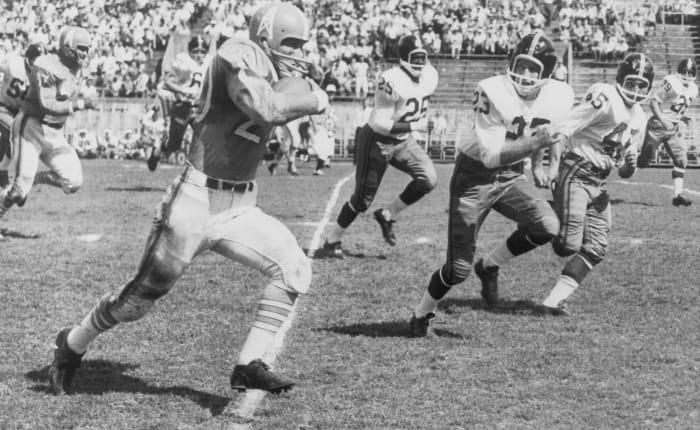
The AFL's first dynasty, the Oilers boasted legit firepower. George Blanda's franchise single-season TD pass record (36) still stands 60 years later; A.J. Brown has serious work to do to catch Charley Hennigan's 1961 receiving mark (1,746 yards). The Oilers thrived in the pass-crazed league by signing ex-Bears QB Blanda out of retirement, and wideouts Hennigan and Bill Groman still reside atop the Oilers/Titans single-season leaderboard. Adding to Houston's loaded offense: ex-Heisman-winning back Billy Cannon, who scored in each AFL title game to key both wins over the Chargers. The Dallas Texans denied the Oilers a three-peat in double overtime.
1960-62 Green Bay Packers
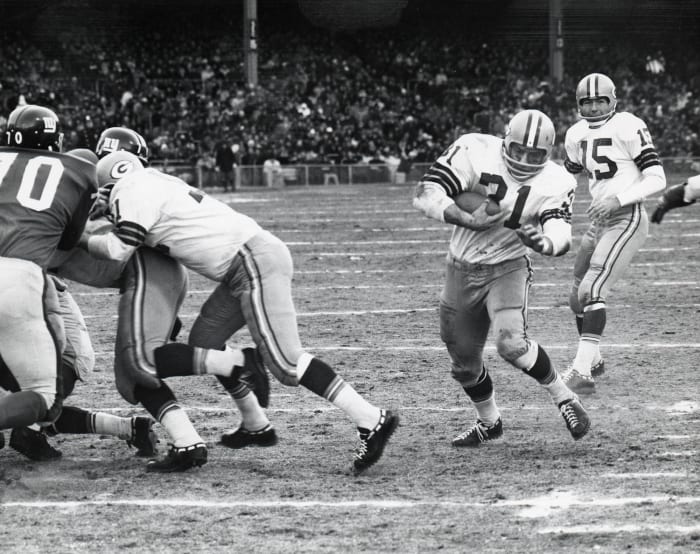
The "Ice Bowl' stretch receives more attention; these Packer teams were better. In 1962, Green Bay went 14-1, outscored opponents by an insane 276 points, led the NFL in offense and defense, and repeated as champion at Yankee Stadium. Lombardi took over the Packers in 1959 and had them in the championship in Year 2. After the Eagles became the only team to defeat a Lombardi Packers team in a title game, Green Bay's Jim Taylor- and Paul Hornung-centered power sweep took over the NFL. The Packers beat the Giants 37-0 in the 1961 title game. Eleven Hall of Famers started for the Mt. Rushmore-caliber '62 squad.
Sam Robinson is a Kansas City, Mo.-based writer who mostly writes about the NFL. He has covered sports for nearly 10 years. Boxing, the Royals and Pandora stations featuring female rock protagonists are some of his go-tos. Occasionally interesting tweets @SRobinson25.
More must-reads:
- The greatest QB rivalries in NFL history
- The greatest backup quarterbacks in NFL history
- The 'NFL MVP runners-up' quiz
Breaking News
Customize Your Newsletter
 +
+
Get the latest news and rumors, customized to your favorite sports and teams. Emailed daily. Always free!
Use of this website (including any and all parts and
components) constitutes your acceptance of these
Terms of Service and Privacy Policy.

